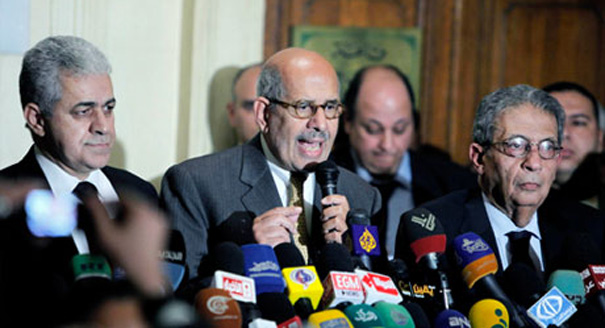This resource was published on 09/03/2013 and is not updated to reflect changing circumstances.
On November 24, 2012, leading Egyptian opposition politicians and political parties came together in the National Salvation Front (NSF) to coordinate opposition to a constitutional declaration issued by then president Mohamed Morsi on November 22. The declaration placed the decisions of the president and the Constituent Assembly, the body writing Egypt’s new constitution, beyond the purview of judicial review. Morsi’s opponents viewed the move as a dangerous attempt to assert authoritarian powers.
The formation of the NSF marked the first time in which Egypt’s secular politicians united – at least nominally – in their political competition against the Muslim Brotherhood and other Islamist political parties.
Membership
At the time of the NSF’s formation, its three most prominent members were Mohamed ElBaradei, co-founder of the liberal Constitution Party; Amr Moussa, co-founder of the secular Conference Party; and Hamdeen Sabahi, co-founder of the Egyptian Popular Current, another secular alliance. All three had run for president. ElBaradei became the organization’s first general coordinator on December 5, 2012.
In addition to these three leaders and their parties, a number of other opposition organizations joined the front. Some of the most prominent of these were the Wafd Party, the Free Egyptians Party, the Dignity Party, the Egypt Freedom Party, the Egyptian Social Democratic Party, the Kifaya Movement, the April 6 Youth Movement, and the Maspero Youth Union.
Background
The NSF adopted a rigid stance toward Morsi’s November 22 declaration of presidential authority over the constitution-drafting process, declaring that it would not meet with Morsi until he had rescinded it. For the next three weeks, the coalition organized massive protests against the president and the Brotherhood.
After Morsi’s attempts at dialogue were rebuffed by the NSF, the Islamist-dominated Constituent Assembly passed a final draft of the constitution in a rushed vote and the president chose to hold a referendum on the new constitution rather than conceding to the opposition. With the referendum scheduled for December 15, the NSF initially called on its supporters to boycott the vote, then later switched positions and urged its members to vote “no.” The constitution passed with 64 percent of the vote. Turnout was low at only 33 percent of eligible voters.
In the aftermath of the constitutional referendum, the NSF continued to coordinate opposition to the president and his policies. It organized protests for the two-year anniversary of the January 25 Revolution that ousted President Hosni Mubarak, and the country’s political crisis deepened when clashes between protesters and security forces turned deadly. The demonstrations continued for weeks as the NSF sought to maintain its pressure on the president.
On February 21, Morsi issued a decree calling for parliamentary elections to begin at the end of April. Five days later, the NSF announced its intention to boycott the elections based on concerns that the elections law was not fair and would benefit the Brotherhood’s Freedom and Justice Party. As the contentious relationship between the president and the opposition continued into the spring, the NSF’s stance on the elections gradually softened, particularly after the Supreme Constitutional Court declared the original elections law unconstitutional and sent it back to the Shura Council, the upper house of the Egyptian parliament and the only legislative body functioning at the time, to be rewritten.
For much of spring 2013, the NSF appeared to be handicapped by infighting and unable to mobilize its potential political supporters. The coalition’s fortunes changed when its leading political figures, including ElBaradei, Moussa, and Sabahi, endorsed the signature drive orchestrated by the Rebel Movement. The petition, which aspired to be a vote of no confidence in the president and called for early presidential elections, revitalized the opposition by giving it a clear goal. NSF organizations donated their offices and resources to the campaign, which ultimately mobilized millions of Egyptians against the president. The success of the signature drive and the size of the protests it inspired in late June and early July encouraged the military to intervene and remove Morsi from power on July 3, 2013.
After Morsi’s Fall
The collapse of Morsi’s government, the public backlash against the Brotherhood, and the military’s intervention on July 3 significantly improved the political position of the NSF’s member parties and politicians, several of whom joined the interim government that replaced the Morsi administration. ElBaradei was appointed vice president for international relations after the al-Nour Party, a Salafi political party that supported the military’s intervention against Morsi, blocked him from becoming prime minister. Hazem El-Beblawi, a former minister and a member of the Egyptian Social Democratic Party, became prime minister instead. After ElBaradei moved to the government, Amr Moussa took over as general coordinator of the NSF.
Since Morsi’s ouster, the NSF has continued to support the military in its conflict with the Brotherhood. However, disagreements with both the interim government and the military have started to emerge, in addition to divisions within the coalition. After the NSF supported the security forces’ crackdown against pro-Morsi protesters on August 14, which resulted in the deaths of hundreds of Egyptians, ElBaradei resigned from the vice presidency. NSF spokesperson Khaled Dawould also resigned. Both have now been ostracized from the coalition, with Moussa announcing that ElBaradei’s role in the NSF is finished.
Meanwhile, the coalition’s leading politicians, including Moussa and Sabahi, have voiced opposition to the idea of Defense Minister Abdel Fattah el-Sisi, the general who ousted Morsi, running for president. The NSF has also opposed parts of the interim government’s road map and some of the proposed revisions to the constitution, including a return to the single-candidate system that was used by the Mubarak regime.





